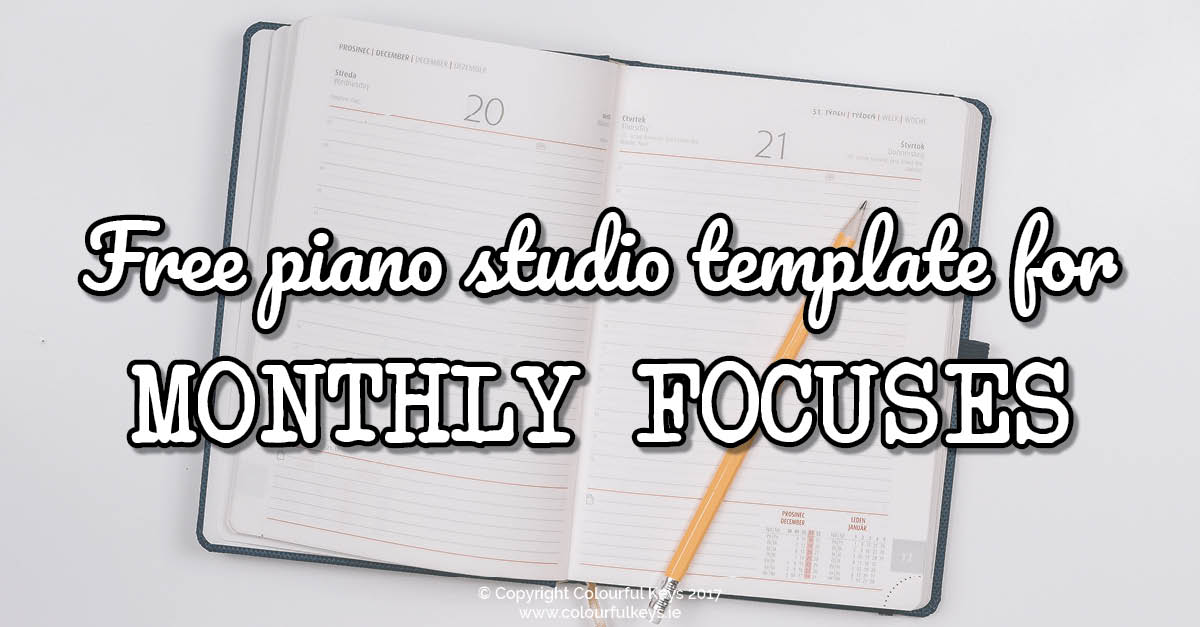Have you ever felt overwhelmed by all the possible stuff you could be including in lessons? Confused as to what to prioritise week-to-week?

Monthly focuses or themes can be very helpful to make this more manageable.
By deciding what topic you’ll cover with your students each month, and keeping it the same across your studio, you’ll feel more confident that you will get to everything important throughout the course of a year.
So let’s reduce that overwhelm!
How to Use Monthly Focuses
Setting up monthly focuses for your studio really couldn’t be simpler. All you need is a list of themes that you want to rotate (we’ll look at that below) and a schedule for rotating them.
I’ve set up a template for you to get started creating your table in Google Docs. Click here to create a copy of the template.

As you’ll see in the template, I’ve dedicated a few months in a row to certain themes. I’ve also put in a “challenge” column which refers to my challenge board.
There are no rules here! But just having monthly focuses set up is very helpful to manage your planning and stop you feeling overwhelmed.
Possible Monthly Focuses for Your Piano Studio
So, if you’re going to alternate topics, you need a list of topics.
The Every Lesson List
Start by making a list of areas you want to cover in each and every lesson – without exception.
It might look something like this:
- Repertoire/method book pieces
- Technique
…or it might be a longer list. But don’t let it get super long! Remember this is stuff that you include in every lesson. Not most or some.
The Some Lessons List
Next, make a list of what you include sometimes. This will probably be a much longer list, including, but not limited to:
- Scales
- Chords
- Composing
- History
- Note names
- Sight reading
- Improvisation
Perhaps scales goes in your first list. Or maybe improvisation does.
These lists will vary greatly from teacher to teacher, and that’s exactly why this system works.
How to Make Your Monthly Focuses Schedule
Now you can just plug your “sometimes” list into the spots in the monthly focuses template.
Be strategic about where you put each theme. You might like to focus on scales in the lead up to an exam and sight reading at the start of a new term for example.
Once you have it set, display it prominently in your studio. This will encourage you to stick to it and your students can start getting excited about upcoming topics.
Have you tried setting monthly themes in your piano studio?
I’d love to hear how it went for you in the comments or in the Vibrant Music Studio Teachers community on Facebook. 🙂

I was inspired to choose monthly focuses after participating in piano pivot with you. It has definitely simplified my planning and helped me ensure I’m covering all the different elements of music . I use the piano group lesson at the beginning of the month as a kick off for the new theme and then include private lesson activities and leaderboard challenges that relate to it throughout the month. So far this year I’ve chosen the themes of effective practice, composition, technique, theory terms and signs, and a May mashup with note reading, rhythm and ear training. Thanks for inspiring me to be a better teacher! There are more details in the posts on my blog heidispianonotes.blogspot.com about my theory carnival, May mashup group lessons and a roundup of composition and practice themed resources.
Great to hear that’s worked out so well for you Heidi. 🙂
So, with the monthly focus, are you focusing on that every week, choosing games/assignments and making lesson plans accordingly? Or do you use a challenge to keep the monthly focus and then cover other concepts weekly? For example, if the focus is Rhythm, would you only use rhythm games that month and focus on the rhythm sections in their theory book OR would you use a challenge to keep the focus on rhythm but use various concepts when choosing games and assignments, i.e. note naming games, solfa exercises, etc.
I would still be doing other things too. I recommend dividing your parts of the lesson into stuff that you’ll do every week, and stuff that you won’t. The stuff that won’t be every week you can rotate with monthly themes.